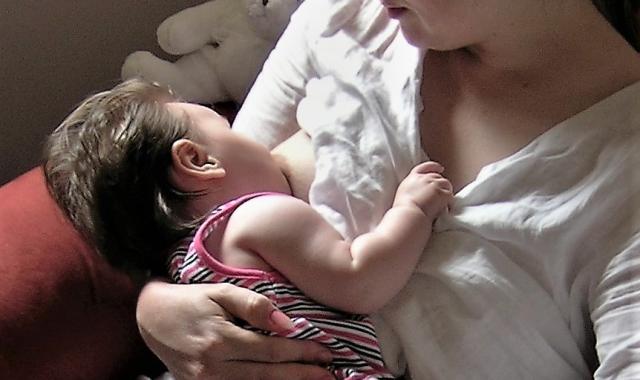Thyroid conditions can affect breastfeeding.

The thyroid gland
The thyroid is a gland in the front of your neck which makes hormones that are important in breastfeeding. If your thyroid isn’t functioning properly, it can affect normal growth and function of the body including milk production.
Diseases of the thyroid include hypothyroidism (under-active thyroid), hyperthyroidism (over-active thyroid), post-partum thyroid disfunction and thyroid cancer.
Hypothyroidism
Symptoms of hypothyroidism include:
-
fatigue
-
weight gain
-
intolerance to cold
-
low mood
-
heavy and prolonged menstrual flow
-
absence of a menstrual period in a woman of reproductive age
-
constipation
-
dry scaly skin
-
hair loss.
Some breastfeeding mothers with hypothyroidism find it hard to make a full milk supply. Thyroid hormones play a role in normal breast development and helping breasts to make milk. If your body doesn't make enough thyroid hormones, your milk supply may be affected.
Hypothyroidism is treated with thyroxine to bring the levels back to normal. If you have been properly treated for hypothyroidism, you are likely to have no problems with your milk supply.
In some women, milk supply is sensitive to the level of thyroid hormone in their bloodstream. They find that having thyroid hormone levels within the normal range isn't enough for them to make a full milk supply. However, they are able to make a full milk supply when the thyroid hormone level is within the upper part of the normal range. This may reflect their own personal set point.
Hyperthyroidism
Symptoms of hyperthyroidism include:
-
fatigue
-
tremors
-
anxiety
-
palpitations
-
intolerance of heat
-
sweating
-
weight loss
-
increased pulse rate
-
diarrhoea
-
light or no menstrual flow.
Hyperthyroidism is usually treated with anti-thyroid drugs which reduce the amount of thyroid hormones your body makes. Radioactive iodine or surgery are other treatments for hyperthyroidism, particularly if it is long standing or difficult to control with medication.
In the 12 months after a woman gives birth, it is important that hyperthyroidism due to Graves’ disease is not confused with the hyperthyroid phase of post-partum thyroiditis (see below). This is important since these two conditions have different causes and treatments.
Some women with hyperthyroidism report a large milk supply, but others seem to have difficulty with their let-down reflex.
Postpartum thyroiditis
Post-partum thyroiditis is an autoimmune disease which can occur during the first year after you give birth. During pregnancy, your immune system is naturally suppressed so that it doesn't attack the developing foetus. After birth, your immune system becomes heightened once again. This ‘immune rebound’ can trigger post-partum thyroiditis. Post-partum thyroiditis may represent a thyroid autoimmunity that was silent before pregnancy.
Post-partum thyroiditis may present as hypothyroidism alone, hyperthyroidism alone, or hyperthyroidism followed by hypothyroidism.
Many symptoms of hypothyroidism or hyperthyroidism are common in the post-partum period in ‘normal’ women so sometimes women and their doctors might miss the diagnosis. Also, some thyroid problems may be mistaken as postnatal depression or other illnesses.
Most women recover from post-partum thyroiditis. However, a small percentage remain hypothyroid, and many more are at risk of developing thyroid disease later in life. Some women with post-partum thyroiditis find they have milk supply problems but others breastfeed without difficulty.
Thyroid cancer
Thyroid cancer carries risks to the breastfeeding mother and her baby in both diagnosis and treatment. Both require the use of radioactive drugs including radioactive iodine which means you can't breastfeed.
Thyroid disease medication and breastfeeding
If you had thyroid disease before becoming pregnant, you will need to have your thyroid levels checked often throughout your pregnancy and while breastfeeding. Your medication doses may need to be adjusted to maintain normal thyroid hormone levels.
Almost all thyroid medications are fine to take while breastfeeding. Many breastfeeding mums with thyroid disease take medications to treat it and safely continue to breastfeed. Find accurate and up-to-date information about the use of medications and breastfeeding.
The information on this website does not replace advice from your health care provider.
© Australian Breastfeeding Association April 2022


